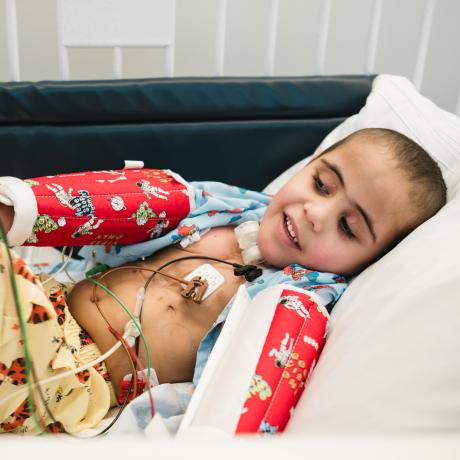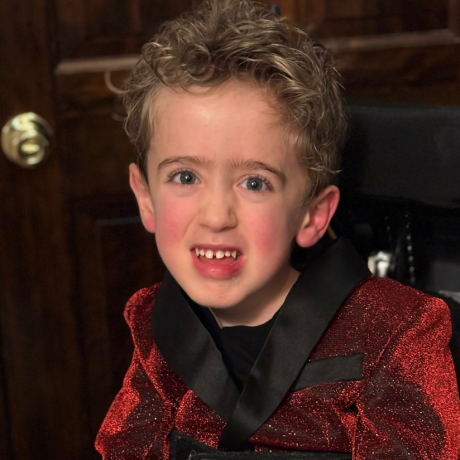Lily’s harrowing medical care journey and the weeks she spent at Connecticut Children’s, fighting for her life, is nothing short of a miracle.
An energetic, happy baby but….
Soon after her first birthday, Lily spiked a fever and she developed a rash and swollen joints. Without an obvious cause, she was admitted to Connecticut Children’s, where doctors spent 10 days conducting extensive blood tests.
The Rheumatology team believed Lily had systemic juvenile idiopathic arthritis (SJIA) and recommended anakinra, a drug used to reduce symptoms and slow the damage of active arthritis. Amanda and Luke, Lily’s mom and dad, learned that with SJIA, a flare up could cause severe damage to Lily’s organs.
Her fevers and rashes persisted which suggested to the Rheumatology team that she also had macrophage activation syndrome, a potentially life-threatening massive inflammatory complication that overwhelms the whole body and is a complication of SJIA. While this was happening, Luke and Amanda noticed her nighttime breathing was becoming very strained.
Lily needs help breathing
Lily was put on a ventilator to maintain her oxygen saturation levels. More testing was done and Lily was also diagnosed with pulmonary alveolar proteinosis, a rare disease and a form of interstitial lung disease, in which protein builds up in the lungs’ air sacs making breathing extremely difficult.
Moved to the hematology/oncology floor, Lily began chemotherapy, one of the ways this disease is treated. Plagued by dangerously low blood pressure levels, doctors gave Lily fluid resuscitation. Saline solution was pushed through her veins, which helped elevate her blood pressure levels, but she was struggling. Doctors immediately called a code blue, indicating a medical emergency as the result of respiratory or cardiac arrest.
Fighting for her life
Lily was rushed to the Pediatric Intensive Care Unit. A physician from hematology came in and told Amanda and Luke that Lily’s condition was deteriorating quickly and they weren’t sure how much longer they could sustain her life.
The doctors worked through the night and kept her alive, but in the morning, she was still struggling. One of the hematology doctors sat down with Luke and Amanda and said the team believed she also had hemophagocytic lymphohistiocytosis, a rare but potentially fatal condition in which certain white blood cells build up and damage organs--including the bone marrow, liver and spleen—and destroy other blood cells.
Gamifant®, a drug in trial stages in Europe was very recently approved in the US for treatment of this disease. Since it was so new, Kerry Moss, MD, pediatric hematology and oncology specialist, researched it and by the next day, was able to obtain and administer the drug to Lily. The single dose worked. But the looming question: how do we acquire more and what do we do next?
Life-saving treatment from Switzerland
Through compassionate use, which allows eligible individuals to legally request and obtain certain medications during end-of-life or immediately life-threatening conditions, the team obtained 15 doses of Gamifant® from Europe. To ensure Lily’s frail and compromised body could handle the robust treatments, it was administered in three-day intervals. After 15 rounds of the drug and eight weeks in the hospital, Lily could finally go home.
Today, Lily is on an oxygen concentrator as well as a daily medication regimen. In addition to seeing experts from the Division of Rheumatology, she is closely monitored by medical teams from Pulmonology, Cardiology, Radiology, Ophthalmology and Endocrinology. When asked about her prognosis, Luke says, “There are not that many kids like Lily. Each child is slightly different. Despite our ordeal, I feel like everything happens for a reason and maybe by Lily going through this, we have been able to help other families obtain this medication and support.”
Lily dances, participates in karate and loves to paint. She is creative, friendly, a warrior, a good self-advocate and speaks her truth. But above all, Lily is resilient.



